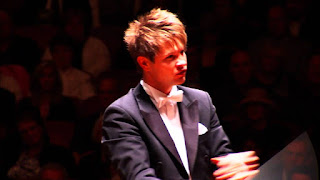ISO Classical Series: End of a season, with the end of a music director's tenure in sight
 |
| Krzysztof Urbanski has been ISO music director since 2011. |
With the Polish conductor due to leave in two years, there will be a new artistic path forged for the orchestra has it heads toward its centenary in 2030. Urbanski has proved himself firmly at home in the conventional repertoire, with his reaches slightly far afield (leaving aside commissioned works) representing modern music of his homeland.
This weekend's concerts seem to suggest that if 19th-century Vienna was the place to be for music-lovers, apparently so too is 21st-century Indianapolis — and with the same music. That fact may cheer you or depress you, but what the Classical Series farewell for 2018-19 illustrates is the flourishing of high romanticism (in both its conservative and advanced wings) still feels like home for the ISO's Hilbert Circle Theatre patrons.
At any rate, just two works whose composers once represented opposing camps in long-forgotten cultural wars in the Imperial Capital are on this weekend's program: Johannes Brahms' Symphony No. 4 in E minor and Anton Bruckner's Te Deum.
The Brahms symphony, which occupied the first half of Friday's concert, caps Urbanski's survey this season of the four symphonies by the North German master who found Vienna so gemütlich. There was a further retrospective aspect to the programming in that, five seasons ago, the same work was the marquee item as the ISO's 2014-15 season got under way. I won't pretend I have detailed memories of the performance I heard then, but my blog review at the time prods my memory helpfully. And it's virtually certain that Friday's was the better performance, and gives an indication of the ISO's improvement over the course of Urbanski's tenure.
The reading emphasized the craftsmanlike nature of Brahms, a consistent aspect of his music. Brahms joked about his consistency, saying he always seemed "to be milking the same udder." In this performance of his most well-regarded symphony, the structure was always clear; the classic forms stood tall. But sensitive Brahms interpretations are never haphazard about tone color either, and that aspect was also outstanding, especially in the scherzo movement — Brahms at his jolliest. This performance justified the ISO's marketing of this program as "Brilliant Brahms."
The winds had a good night: The strong horn playing at the start of the second movement lent immediate luster to it; clarinet playing in the theme was outstanding. Karen Moratz warmly sent aloft the ethereal flute solo in one of the variations in the finale. At intermission she was honored as the latest recipient of the Patch Award, which holds up ISO members regarded by their peers as good musical citizens.
 |
| Eric Stark in a podium appearance; for this concert, his work was behind the scenes. |
But wait, there's more, as the late-night TV commercials used to say. After intermission, Urbanski led the ISO, the Indianapolis Symphonic Choir and four vocal soloists in the Bruckner Te Deum. The choral writing covers the dynamic spectrum boldly, and as usual the ISC's artistic director, Eric Stark, had prepared his large forces well. The orchestra was a fit partner, and guest concertmaster Bosun Mo's violin solos displayed an enchanting lilt and ardor.
The devout Bruckner knew that this work, unlike his Mass settings, was not appropriate in a liturgical context, so he fashioned it to make a concert-hall spectacle out of the ancient Latin hymn in praise of God, with plenty of emphasis on personal piety. The solo quartet engaged for this weekend sounded fine in ensemble; individually, most of the burden was carried by the excellent tenor, Paul Groves. His capable colleagues were Sarah Shafer, soprano; Kelley O'Connor, mezzo-soprano; and Alexander Elliott, baritone.
Apart from some lack of confidence as staggered choral entries began the work's last line, the choir sounded as if the concert could have been labeled "Brilliant Bruckner" as well, with the same alliterative panache. At the end, the sopranos' taxing sustained notes above the staff whitened somewhat, but whose wouldn't? The effect was still thrilling. Bruckner clearly wanted to implore God never to confound him in the most reverent, but insistent, terms.
Both composers could have gone on till kingdom come, each in his own way, despite the contamination of partisanship that once surrounded their music. The great advantage of these works' continuing to speak to 21st-century Indianapolis is that what Brahms and Bruckner were once taken to represent can be discarded, leaving behind the art to be enjoyed. Till kingdom come.



Comments
Post a Comment